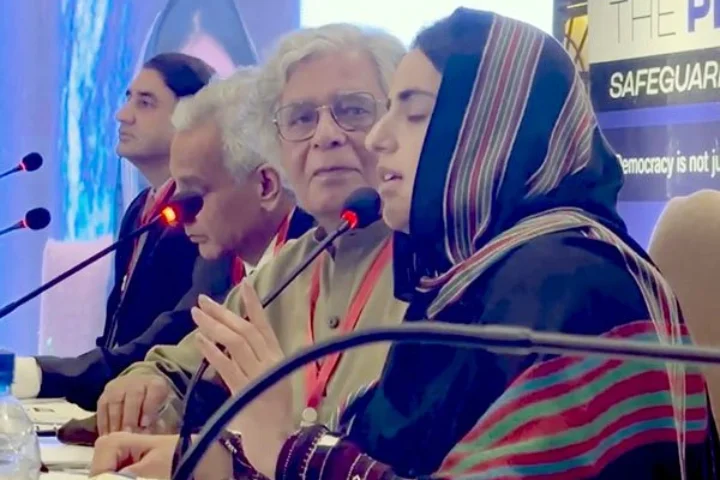

Baloch activist Mahrang Baloch (Photo: @BalochYakjehtiC)
Baloch rights activist Mahrang Baloch has highlighted the atrocities inflicted upon Baloch women by the government of Pakistan.
She was speaking at the fifth edition of the Asma Jahangir Conference 2024, titled “People’s Mandate, Protection of Civil Rights in South Asia” which concluded in Lahore on Sunday. It witnessed the participation of several judges, human rights activists, office bearers from the government of Pakistan, Samaa TV reported.
In the event, prominent personalities from Sri Lanka, Denmark, the Middle East, Europe, Great Britain, and Norway discussed the situation of Human and civil rights in the South Asian Conference.
During the event, Mahrang Baloch delivered a statement highlighting the atrocities inflicted upon Baloch women by the Pakistan government.
While discussing the topic of ‘Women in Conflict and the Gender Cost of Violence’, Mahrang Baloch said, “Women are the biggest victims of state violence, but they have lost their identities for this struggle. They are often recognized as sisters, wives mothers, and daughters of the violence victims. No one will ever come to know their real names and identities. No one can ever comprehend the pain of these mothers who received the mutilated bodies of their sons.”
“They often request the administration to, at least leave the faces of these victims intact, as those faces are the last memories that these mothers have of their beloved sons. And now this mutilated face of their loved one will become another memory and will stay fresh in the consciousness of these mothers,” he added.
She also highlighted the staggering humanitarian crisis in the region and said that the women are being raped and sexually harassed.
“The eyes and other parts of the face that a mother often loves and recognizes since childbirth are mutilated to such an extent that not even they can recognize their kid. Governments that have an obsession with gaining power and then suppressing the weak through their policies have pushed humanity to such a level that will engulf us humans for several centuries to come. The reminisces of these struggles between the weak and powerful survive for centuries and make people remember the cost that was paid during that struggle. And unfortunately, women are the ones who suffer the most in these incidents” she said.
“We cannot move forward until this problem is addressed. The mothers, sisters, wives, and daughters of Balochistan have been struggling like this for more than two decades. These women are often exposed, to brutal punishments, like rape and sexual violence. Protests and voices are often raised when women are oppressed in other parts of the world, similarly, voices must be raised for the oppression of Baloch women. But, unfortunately, no feminists and social activists respond to the pain and suffering that the Baloch women have to suffer,” she added.
While raising the matter of enforced disappearances Mahrang Baloch stated “The cases of enforced disappearances have been a curse for the people of Balochistan. It is not a mere crime against humanity, but it is a tool utilized by the state to suppress the Baloch people and to loot their resources. For more than 20 years Baloch women in the form of mothers, sisters, daughters, and wives have been struggling for the safe return of their loved ones. Women are often given corporal punishments like and are harassed sexually and physically.”
“Several places in Balochistan Awaran, Bolan, and Kohlu have prisons for women who participate in protests against the Pakistani Administration demanding the safe return of their loved ones. Women in these prisons are often exposed to severe punishments. There are also cases where women are kidnapped for merely pressuring these protestors. They are often given to soldier and death squad camps where they are sexually and physically abused. We have also come across cases where young girls are married to death squad members forcibly,” she pointed out.
Asma Jahangir was a prominent human rights lawyer from Pakistan and was also a UN Special Rapporteur on the situation of human rights in the Islamic Republic of Iran during her life she also received the prestigious UN Human Rights Prize. The prize was awarded posthumously to Jahangir who died earlier in 2018 in her home country of Pakistan at the age of 66 a report by United Nations Human Rights Council stated.
External Affairs Minister S Jaishankar on Tuesday called on member nations of the Shanghai Cooperation…
External Affairs Minister S Jaishankar held a meeting with his Russian counterpart, Sergey Lavrov, on…
The ongoing bilateral trade talks (BTA) negotiations by India and the United States (US) are…
By Shailesh Yadav Petroleum and Natural Gas Minister Hardeep Singh Puri emphasised that sufficient energy…
Mongol, Tibetan, and Japanese communities from across the Tokai region of Honshu Island gathered in…
Indian astronaut Subhanshu Shukla's 15-day mission in space will play a crucial role in India's…